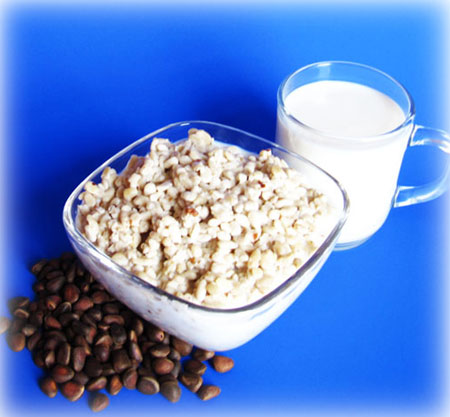INGREDIENTS: 100% natural, wild harvested, cold pressed by wooden press Cedar Nut Flakes. May contain cedar nut film a rich source of silicone.
Not processed
Does not contain sugar, preservatives, chemical colorants or addictives
Does not contain GMO
Rich source of Natural Protein.
Keep Refrigerated.
 The flakes of the cedar nut are obtained by pressing the cedar nut oil from the kernel of the cedar nut. In contrast to the whole cedar nut, cedar nut flakes are distinguished by their increased proportional content of vitamins, trace elements, and plant proteins owing to the reduction of the fat content. In the processing of pressing the cedar nut oil, 10–16% of the cedar nut oil is retained in the flakes.
The flakes of the cedar nut are obtained by pressing the cedar nut oil from the kernel of the cedar nut. In contrast to the whole cedar nut, cedar nut flakes are distinguished by their increased proportional content of vitamins, trace elements, and plant proteins owing to the reduction of the fat content. In the processing of pressing the cedar nut oil, 10–16% of the cedar nut oil is retained in the flakes.
The protein in the flakes made from the kernel of the cedar nut surpasses an ideal protein in its content of histidine, methionine, cysteine, and tryptophan, and has a well balanced composition. The carbohydrate composition of the kernel of the cedar nut is represented by polysaccharides (starch, cellulose, pentosans, dextrins) and watersoluble sugars (glucose, fructose, sucrose, and raffinose). According to the results of medical research, a similar protein facilitates the dissolving of harmful cholesterol in the blood, and also prevents the formation of cancer cells.
The lecithin contained in cedar nut flakes is a basic chemical substance for the formation of the intercellular space, the normal functioning of the nervous system, and the healthy activity of brain cells. Lecithin is essential for the organism as a building material for the renewal of damaged cells. Lecithin is also the basic transport substance for the delivery of nutrients to the cells.
Lecithin makes up 50% of the liver, 1/3 of the myelin insulating and protective tissues that surround the cerebrum and spinal cord. Lecithin is a powerful antioxidant and prevents the formation of highly toxic free radicals in the organism.
Flakes made from the kernel of the Siberian cedar contain a high quantity of mineral substances—up to 5%, which are represented by a specific set of macroelements and trace elements. There is a high content of phosphorus and magnesium. Only 100 g of cedar nut contains the human daily requirement of magnesium, manganese, copper, zinc, and cobalt. Of special interest is the cedar nut as a natural source of iodine. The daily requirement of iodine is 0.1–0.2 mg, and the cedar nut kernel contains on average 0.577 mg/kg of iodine.
The importance of the flakes with regard to vitamins is characterized by the presence of fatsoluble and watersoluble vitamins, the most basic of which are vitamin F, the tocopherols, thiamine, and riboflavin.
The use of cedar nut flakes is recommended:
- for ulcerous conditions of the stomach and duodenum;
- in increased acidity and gastritis;
- in pulmonary diseases and tuberculosis;
- in nervous disorders;
- in diseases of the kidneys;
- in diseases of the thyroid gland related to an insufficiency of iodine;
- in blood and lymph diseases;
- in malnutrition and emaciation.
Cedar nut flakes should definitely be present in the food allowance of pregnant women, children, and breastfeeding mothers (for lactation). In olden times, when milk was completely absent, children were fed with a mixture prepared from cedar nut flour.
Cedar nut flakes are natural protein, and are extremely suitable for athletes to increase muscle mass.
The flakes have a pleasant nutty taste and aroma, are easily digested, and can include particles of the membrane of the cedar nut pericarp, which is rich in potassium.
DIRECTIONS FOR USE:
Cedar nut flakes are used as a complement to food (in porridge, salads), as part of flourbased confectionaries, as well as a separate food product. The consumption of 3–5 tablespoons of flakes a day fully provides the organism with essential components.
COOKING INSTRUCTIONS

1. Fill the bowl with cedar nut flakes.
2. Blend your flakes with honey and/or fresh or dry fruits (for example, banana slices, strawberries, kiwi fruit, peach slices etc.)
3. Add warm milk just to cover ingredients and stir. Add more milk if the mix seems too thick and stir again. Instead of milk you can add juice, maple syrup, kefir or yogurt.
4. Depending on the type of liquid you use, you may wish to leave cedar nut flakes for 1015 minutes to mesh well with it.
RECIPES
1. Cedar Nut Flakes Salad. In a large bowl mix together 1/2 pound romaine lettuce, 1/2 pound quartered cherry tomatoes, 1/2 pound sliced cucumbers, 1/3 cup cedar nut flakes and 1/8 cup finely chopped fresh basil. Pour 34 tbsp cedar nut oil and squeeze 1/2 lemon. Add salt to taste and toss well.
2. Tahini Sauce. Mix together 2 tbsp raw tahini, 1/2 juiced Lemon, 1tbsp Honey, 2 pressed garlic cloves and 2 tbsp cedar nut flakes. This sauce goes deliciously with crackers.
3. Protein Milk. Makes: 47 cups. Combine 1 cup cedar nut flakes and 35 cups water in a blender. You can create the desired thickness by using more or less water. Blend on high for 45 minutes. To sweeten add honey, bananas, dates, figs, raisins, maple syrup or your favorite fruit. Blend again until smooth. You can enjoy it thick or strain it through cheesecloth. Protein milk is perfect alone and with your meal. It will keep for 2 days in the refrigerator in a sealed glass container. Enjoy!

